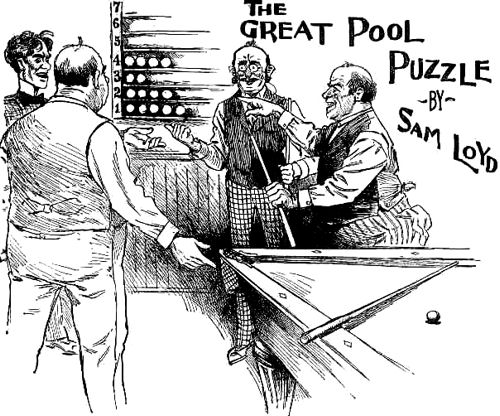



THERE ARE PUZZLES or problems connected with almost all kinds of games, either in the play itself or in the manner of scoring a victory. Now, it is safe to assume that everyone knows more or less about fifteen-ball pool. Nevertheless, here is a little problem which does not call for a practical demonstration with the cue, so our puzzlists will have just as good a chance for the prizes offered for the answers as the most skillful experts.
There are fifteen balls to be pocketed, and according to custom, the one who pockets the least number of balls must pay for the game.
Well, three players were starting a game the other day, and No. 1 who was an expert, agreed to pocket as many balls as players No. 2 and No. 3 both together. Just as they were going to start a fourth man came in and joined them, but, as he was a stranger, he did not receive any handicap odds and played on even terms with each of the other three players.
The rack shows the number of balls which each man made during the play, and a discussion then ensued as to who was the loser.
The puzzle is to tell which one of the players should pay for the game according to the terms of the agreement. That the problem is not so simple as it looks may be inferred from the fact of its having been referred to the competitors in a recent championship pool tournament where it was found that no two of the players agreed upon the same answer. Tell which one should pay lor the game, and why.
This complicated mix-up resulted from an expert agreeing to make as many balls as two inferior plays combined. A fourth player came in the game, however, and being a stranger of unknown strength, played upon even terms with each of the other three, neither giving nor receiving odds. The best player claimed that as he beat No. 4, he did not lose. But No. 4, having beaten No. 3, said that he could not be held for the game, while No. 3 maintained that in partnership with No. 2 he had beaten No. 1, and therefore, according to contract, could not be held for the game.
There are other complications which open up different lines of argument, but as No. 4 came in as a free-lance, he is not bound by any private agreements; so, when he made four to the low man's two, he put on his hat and coat and went home. No. 1 then had to live up to his agreement, so, as he had secured but five balls to his opponents’ six, the defeat which No. 3 would have sustained was transferred over to No. 1, who should pay for the game.
But there is another view of the matter which would seem to reverse that verdict. No. 3 has scored against No. 1, by special agreement, but as No. 1 has beaten No. 4, he is relieved of all responsibility, and as Nos. 3 and 4 played upon even terms, without any agreement, No. 3 loses, as he can only plead the terms of the handicap when it is a question of paying between No. 1 and No. 3, unaffected by the acceptance of No. 4.
2. Notes and Queries.
Among the curious questions which find their way into the puzzler's sanctum is the following, which, although not intended as a puzzle, is worth a passing notice as illustrating some of the queer things we are expected to know: “Suppose that three generations of lathers and sons, with the names of all three alike, were residing together, and you wished to send a letter to the third generation, how would you address it?”
Answer: This problem should not cause sleepless nights or needless worry, as a letter addressed to “John Smith the Youngest” would meet the requirements of society and reach its proper destination.
But supposing the communication related to the following business transaction, then the problem would require more careful consideration. The writer had seen that invaluable article known as the ‚Äútailor's goose,‚Äù and knowing that Mr. John Smith manufactured the same, desired to purchase two of them. How should he write his order ‚Ä” ‚ÄúSend me two Tailor's Geese,‚Äù or ‚ÄúSend me two Tailor‚Äôs Gooses.‚Äù
Or would it be considered a “give away” to dodge the issue by saying, “I want a Tailor's Goose, but you may as well send me two of them.”
3.
Why are bells the most, obedient of inanimate things? Because they make a noise whenever they told.
[Page 86]